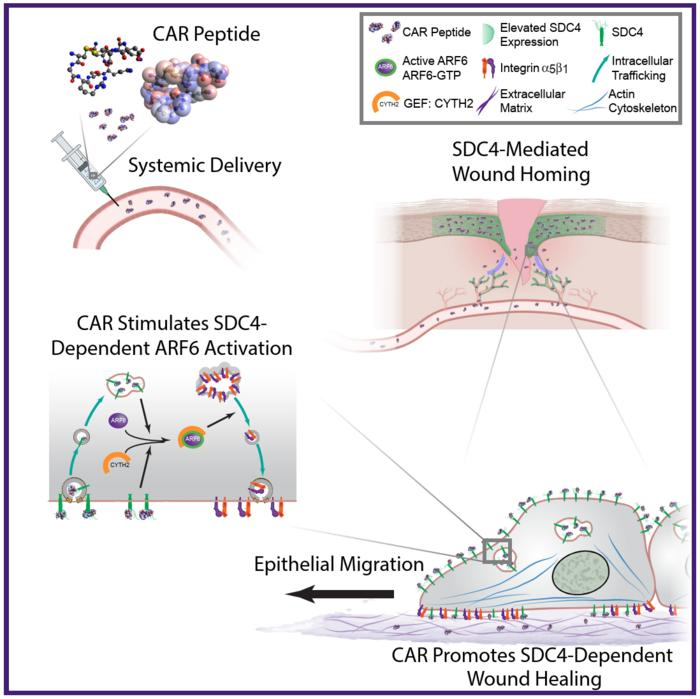Accelerating tissue injury repair while preventing the formation of less functioning scar tissue in the injured areas is one of the main objectives of medical science. Professor Tero Järvinen at Tampere University in Finland is spearheading the research aimed at finding solutions to achieve this objective.
 Schematic diagram highlighting the proposed mechanism of action of car peptide. systemically administered car peptide associates with the hspg sdc4, which is restricted to the epidermis and blood vessels in mouse skin wounds. car induces sdc4-dependent activation of the small GTPase Arf6, via the guanine nucleotide exchange factor cyth2, to promote sdc4-, Arf6- and cyth2-mediated keratinocyte migration and endogenous re-epithelialisation and wound repair mechanisms. Image Credit: Tampere University
Schematic diagram highlighting the proposed mechanism of action of car peptide. systemically administered car peptide associates with the hspg sdc4, which is restricted to the epidermis and blood vessels in mouse skin wounds. car induces sdc4-dependent activation of the small GTPase Arf6, via the guanine nucleotide exchange factor cyth2, to promote sdc4-, Arf6- and cyth2-mediated keratinocyte migration and endogenous re-epithelialisation and wound repair mechanisms. Image Credit: Tampere University
Järvinen found a small protein known as a "homing peptide" in an earlier work. This protein specifically searches for tissue injury through circulation. Because of its amino acid makeup, the homing peptide was given the moniker CAR peptide. It was removed using an in vivo phage display screening technique, removing over a billion peptides.
Through systemic administration, the peptide was utilized to deliver a medication that reduces scarring in the wounds.
The CAR transport peptide has been demonstrated by the research team to be a therapeutic medication in and of itself. Without attaching to any form of medication, CAR speeds up wound healing by activating a natural healing pathway that is essential for tissue regeneration.
The study, which was published in Nature Communications, demonstrated that the CAR peptide enters the wound through the bloodstream and triggers the tissue regeneration mechanism, which is essential for wound healing.
The peptide attaches itself to the cell membrane receptor syndecan-4 in the wound. The process of cell migration, or the movement of healing cells across the injured region of the wound, is initiated by the activation of the Arf6 GTPase by the intracellular cytohesin-2 factor, which is activated by this binding.
Mice that received CAR peptide therapy had much faster skin wound healing than mice that did not get the therapy due to this biochemical mechanism. Additionally, compared to no therapy, the resulting scars were less severe.
The CAR peptide offers several therapeutically meaningful indications not just for traumatology but also for surgery and sports medicine because this syndecan-4 dependent cell migration-mechanism is essential for the healing of various injuries, such as skeletal muscle ruptures and bone fractures.
Syndecan-4-dependent tissue regeneration is a key factor in the healing of several other tissue injuries beyond skin wounds, including muscle ruptures and bone fractures. The CAR peptide we found, which activates this natural healing mechanism, opens completely new possibilities for treating traumas and injuries not only in traumatology but also in surgery and sports injuries.”
Tero Järvinen, Professor, Tampere University
Järvinen explained, “Because the drug molecule actively seeks tissue damage through the bloodstream, the treated injury can be in any part of the body and can be targeted by the CAR peptide therapy.”
Source:
Journal reference:
Maldonado, H., et.al. (2023). Systemically administered wound-homing peptide accelerates wound healing by modulating syndecan-4 function. Nature Communications. doi.org/10.1038/s41467-023-43848-1